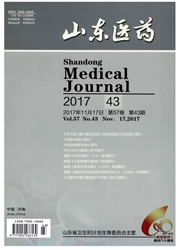

 中文摘要:
中文摘要:
目的采用ABCD2评分法结合颅内外血管检查对短暂性脑缺血发作(TIA)7d内发生脑梗死的风险进行评估,为早期防治TIA、降低脑梗死发生率提供依据。方法148例颈内动脉系统TIA患者进行ABCD2评分,所有患者均行颈动脉血管超声及经颅多普勒(TCD)检查,65例(44.0%)行主动脉弓-颅内CT血管成像(CTA)检查。发病7d内行头颅MRI检查,结合临床体征诊断脑梗死。计算7d内TIA患者脑梗死的发生率。对ABCD2评分≥4分的不同程度颅内动脉狭窄患者TIA7d内脑梗死的发生率进行比较。结果148例TIA患者中,低、中、高危者分别为53、68、27例,20.3%的患者7d内进展为脑梗死,低、中、高危者脑梗死发生率分别为1.9%(1/53)、27.9%(19/68)、37.0%(10/27),三者相比,P均〈0.叭。脑梗死发生率与TIA的ABCD2评分呈正相关(r=0.712,P〈0.05);ABCD2评分≥4分者中,重度颅内动脉狭窄者TIA7d内脑梗死发生率为46.9%(15/32),明显高于正常及轻度者的16.7%(4/24),P〈0.05。结论ABCD2评分在TIA7d内发生脑梗死的预测方面有较好的应用价值,结合颅内血管检查,可提高对TIA短期内脑梗死发生风险预测的准确性。
 英文摘要:
英文摘要:
Objective To make an evaluation of the incidence of cerebral infarction after transient ischemic attack (TIA) in 7 days by ABCD2 score combined with vascular screening, to provide a basis for early prevention and treatment for TIA and reduce the incidence of cerebral infarction. Methods We collected an information of 148 patients with TIA (carotid artery system) and calculated the rate of cerebral infarction caused after TIA in 7 days by ABCD2 score. All pa- tients accepted carotid artery vascular ultrasound and TCD test, among them 65 patients accepted angiography. Head MRI was adopted in all patients in 7 days of TIA to make diagnosis combined with clinical sign. Incidence of TIA in 7 days was calculated. The risks of developing cerebral infarction with ABCD2 score ≥4 but varying degrees of cerebrovascular stenosis were compared. Results A total of 148 patients were included in the study. Patients at low, moderate and high risk of early stroke were 53, 68 and 27, respectively. The risk of recurrent stroke at 7 day were 20.3%. The rate of recurrent stoke at low, moderate and high risk of early stroke were 1.9% ( 1/53), 27.9% ( 19/68), 37.0% ( 10/27), P 〈0.01. The ABCD2 score was positively correlated with the rate of cerebral infarction (r =0. 712). The rate of cerebral infarction in the TIA patients with ABCD2 score ≥4 and severe cerebrovascular stenosis was 46.9% in 7 days, and the risk of develo- ping cerebral infarction increased than that of patients with ABCD2 score ≥ 4 and mild cerebrovascular stenosis ( 16.7% ) ( P 〈 0.05 ). Conclusion ABCD2 score is effective to predict the occurrence cerebral infarction in 7 days after TIA, and the accuracy can be improved by combining vascular screening.
 同期刊论文项目
同期刊论文项目
 同项目期刊论文
同项目期刊论文
 The level of circulating endothelial progenitor cells may be associated with the occurrence and recu
The level of circulating endothelial progenitor cells may be associated with the occurrence and recu Effects of atorvastatin on chronic subdural hematoma: A preliminary report from three medical center
Effects of atorvastatin on chronic subdural hematoma: A preliminary report from three medical center 期刊信息
期刊信息
